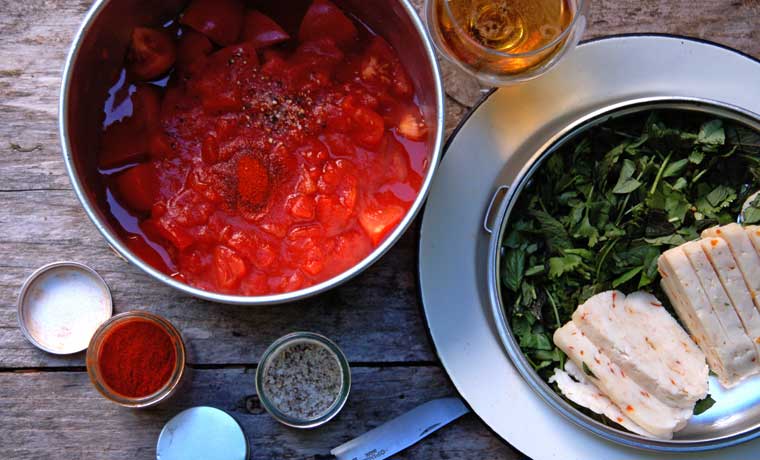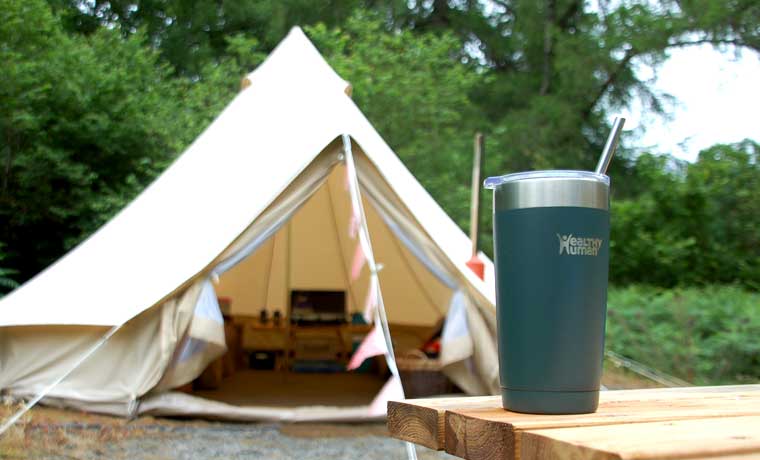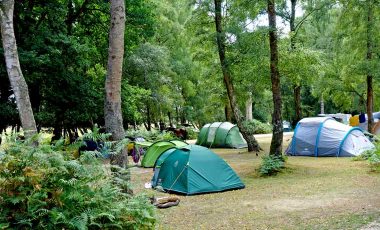Zero waste living is taking the world by storm right now. And, thankfully, it ain’t going anyway any time soon. So, with the help of our zero waste camping guide, let’s all jump onboard and become eco-warriors at the campground, as well as in everyday life.
Unless you’re one of these amazingly inspirational zero waste heroes, there’s always going to be room for improvement when it comes to doing your bit for the planet. We can all put more time, effort and thought into leading more eco-friendly lives. From making better decisions about the food we buy, to making small changes to our daily habits. And taking those decisions and habits into the great outdoors couldn’t be more relevant.
Eco-friendly living shouldn’t stop just because we’re out camping. But it’s very, very easy to let things slide for the sake of convenience, fun and enjoyment.
So, to help you make your next car camping trip as eco-friendly as possible, we’ve compiled a list of ideas you may want to try. They’re super easy to implement. Plus, if you take a little bit of time to get organised before you go camping, your time at camp won’t be consumed with depressing thoughts of our struggling planet — at least not too much, anyway!
Disclaimer: We use affiliate links and may receive a small commission on purchases.

Zero waste ideas when buying food and drink for camping
One of the best things about camping is meal times. Getting together round the campfire to chow down on your favourite dish of char-grilled yumminess sure takes some beating. But meal times are also the easiest time to let our eco-values slide. Organisation is key, as is being a bit adventurous with your camp food buying and cooking.
01Plan your meals
Having a meal plan means no last minute purchases at the campground shop. These items are more likely to be wrapped in lots of plastic, and you’ll have very little choice over what you buy. If you plan well, you can bring all your own food with you, opting for fresh fruit and veg, dried grains and pastas, canned vegetables and beans, and jars of sauces.
02Shop local, if possible
When planning your menu, take a look at what your local food shopping options are. Is there a local farmers’ market or farm shop near to your campground? Perhaps there’s pick-your-own fruit farms or a fish market? Do a little research and you may be able to buy fresh produce that’s local to the area, and not wrapped in plastic!
03Go veggie heavy on the BBQ
I’m sensing I’ve lost some of you here. Traditional BBQing may be all about getting as many different types of meat on your plate at once, but there’s a lot to be said about grilled veggies, fish and cheese. I’m not suggesting eliminating ALL the meat. One step at a time! But replacing those burgers with grilled portobello mushrooms covered in garlic cream cheese doesn’t sound so bad, right? Try it. You might just be surprised!
04Ditch the bottled water
If you’re reading this article, then it’s likely that you stopped buying bottled water years ago (I hope!). That said, many people can’t quite get their heads around the fact that campground water is perfectly drinkable. If it’s for convenience that you take bottled water camping, then its really worth investing in a personal water bottle that you can take everywhere with you. Also, grab yourself a large water container to keep in your camp kitchen.
05Batch cook some snacks
Snacks tend to generate lots of waste, especially if they are all individually packaged. Avoid this by making a big batch of flapjack, energy balls or another yummy traybake that will last the whole trip (in theory!). If you need to pack it for day trips then wrap it in a paper bag that can then be reused or recycled.
06Sample the local ale
Eco-friendly ale sampling? Sounds like a dream! If you’re lucky enough to be camping near a microbrewery then take your own bottles along and fill them up with the local tipple. Not only are you eliminating waste on a number of levels, but you’ll also be supporting small businesses, AND getting to enjoy the fruits of that little bit of extra effort. We call it a microbrew adventure!
07Don’t wrap it in plastic
You’ve done so well at making some really considered decisions about the food you buy to avoid unnecessary plastic. Don’t go and ruin it by wrapping your sarnies in cling wrap! Instead, opt for reusable sandwich bags. Ideal for storing your food to go.

Eco-friendly camp cooking tips
Last minute camping trips call for ease and convenience when it comes to meal times. So if you really want to make some changes to become a more eco-friendly camper, long term organisation is key. Getting prepared with the right stuff before the camping season begins means impromptu camping is a breeze. And if it happens to be eco-friendly then everyone wins!
08Ditch the aluminium foil
Cooking your food in foil on the campfire is so easy. And there’s no denying that the results are delicious. But the foil is not reusable once it’s been used. Super wasteful. Invest in some metal cooking pots. Or better still, grab some old pots from a secondhand store.
09Take reusable cutlery and tableware
Bamboo cutlery is eco-friendly and really nice to use. Or just bring your cutlery from home, unless it’s super posh! Metal or plastic camping plates eliminate the need for single use alternatives and will last you a lifetime of camping.
10Store leftover food properly
We’ve already mention that cling wrap needs to be ditched, as do plastic freezer bags. To make sure your camping food is stored safely try these flat packed silicone food storage bags instead.
11Never use disposable BBQs
Some campgrounds become littered with disposable BBQs at the end of a hot weekend. Not only is that a nightmare for the campground to deal with, they’ll also all end up in landfill. If you’re not ready to invest in a portable grill that will last for the rest of your camping days, then an eco-friendly disposable grill is the next best thing.
12Opt for refillable gas or liquid fuel
Small gas cartridges are so convenient, especially when backpacking and hiking. But they’re not reusable, and are difficult to recycle, too. If you want to keep your gear lightweight then try an alcohol stove, or a stove compatible with liquid fuel that can be refilled. For car camping opt for the larger refillable gas canisters.

Get geared up for camping with an eco-friendly mindset
Making thoughtful choices, when it comes to eco-friendly camping gear, will stay with you for life. No, really. Buy good quality stuff and you won’t have to replace it. There are other ways in which you can be more gear green, too.
13Borrow or rent gear
Borrowing or renting large items like tents and sleeping stuff is a great way to be more eco-friendly. If you camp all the time then this isn’t so practical, so skip onto the next point. But if you’re an infrequent camper, or new to camping and not sure you’ll like it, it’s a great way avoid buying gear that you may never use again.
14Buy gear that lasts
If you’ve borrowed or rented gear and are ready to invest in your own stuff, try to avoid buying cheap. This is a tough one to get your head around as the initial layout can be significantly more than seemingly similar alternatives that are half the price. But buying high quality gear will be well worth it in the long run. Start collecting gear over time and search the sales for some bargains. Alternatively, some brands, like The North Face, are moving towards selling repurposed gear. There are also more and more environmentally conscious outdoor gear brands emerging every year.
15Repair broken gear, don’t trash it
The number of ‘broken’ camping chairs I’ve seen in (and have retrieved from) campground waste disposal areas is frightening. Sure, some are irreparable. But many just need a screw replacing or the odd stitch up here or there. So before you condemn your damaged or broken gear to landfill, have a go at fixing it. Or, check out the repair policy of the item. Brands like Patagonia are hot on repairing gear. As are Osprey — I sent my bag back to be fixed and it lasted me 5 years of daily use and abuse!
16Don’t buy miniature toiletries
There’s no need to be over the top on space saving when car camping — just bring along all your usual toiletries. However, if you do need to downsize, there really is no need to buy miniature versions of everything. Instead, save up small jars from cooking sauces or spices and decant your lotions and potions into them.
17Recharge your devices with solar power
Most electronic gear is rechargeable these days. Even many headlamps can be plugged into the mains to boost their batteries. If you’re at camp for a while then the best way to add juice to your lights, lanterns, phones and devices is using solar power chargers.
Waste disposal and clean up
Correct waste disposal is a really big one, and it pays to keep on top of it for the duration of your trip. Otherwise, you’re left picking through a weeks’ worth of trash to separate the recyclables. No thanks!
18Separate your recyclables
To make this as easy as possible bring a couple of containers or boxes so you can separate things as you go. Also, be prepared to take all your recycling home with you as not all campgrounds have the right facilities.
19Use a good old-fashioned dish cloth and tea towel
Paper towels and wet wipes make cleaning up after cooking a doddle. But our grandparents got through life without them. So can we! Bring cotton dishcloths and tea towels and leave them out to dry between meals.
20Use biodegradable washing up liquid and soaps
This is especially important when camping in basic campgrounds that may not be connected to sewage systems. A multi purpose wash can be used for body and hair washing as well as for dishes and clothing.
21Clean up your site before you leave
Finally, before you leave your camping site spend 10 minutes doing a sweep. Pick up any little bits of food and trash that have slipped through the net during your stay.
Leave No Trace
With all our attention placed on the domestic ways we can become more green when camping, it’s important that we don’t neglect the Leave No Trace (LNT) principles.
If you’ve never heard of LNT then take our quiz to see how well you treat our wonderful wilderness spaces.



